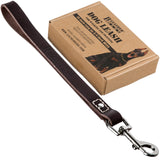Dog owners are always in fear of their dog ripping apart the house when they’re left alone. If your dog does act out when you’re gone, it might be a sign your dog suffers from separation anxiety.
What is Separation Anxiety?
Separation Anxiety is a dog behavior problem that shows itself in excessive barking, whining, destroying of items around the house, scratching at walls and floors, etc. Basically, it comes from the fact your dog becomes stressed out when you leave the home. It can be a real burden for the owner because no dog owner wants his/her dog to be unhappy. It’s also a problem because it comes from the fact your dog just wants to be with you at all times, therefore, making you to feel guilty for leaving the house. However, it’s important to realize they’re two types of separation anxiety: stimulated separation anxiety and true separation anxiety.
What’s the Difference between Stimulated and True Separation Anxiety?
Stimulated separation anxiety in dogs is a learned behavior by your dog. They realize acting badly will get them your attention; therefore, making you notice them is a reward for them. Even a negative reaction from you is a reward for your dog because it tells them you noticed them. Often, stimulated separation anxiety in dogs comes from a lack of leadership from you and self-control from your dog. You can discourage this behavior by increasing their crate time when you're home and when you're away. The extended crate time will give your dog a sense of security, while, removing the temptation of ripping up your house. In addition, giving them more exercise during the day will help because it will tire them out to the point where ripping apart the house seems like too much effort. Also, being more assertive in your interactions with your dog would be another effective way to discourage this behavior. In other words, be stricter with your commands and show stronger leadership. Unfortunately, true separation anxiety will be a much more difficult task because your dog the really does feel stress when you’re gone.
A dog with true separation anxiety isn’t the dog that follows you around the house or gets upset when you leave but then relaxes. It’s the dogs that will actually hurt themselves to try to find you when you’re gone; Dog anxiety might present itself through your dog repeatedly howl in your absence or relieve themselves in the house, even when, they’re housebroken. Honestly, it’s terrifying to come home and find your dog with blood paws because they were trying to claw through the door to find you; an experience I had because one of my dogs suffers from true separation anxiety. However, It doesn’t always manifest itself in your dog physically harming themselves; it might be that they will not stop whining or pacing in your absence. In fact, true separation anxiety in dogs usually comes from a dog being extremely attached to a single person; therefore, a dog sitter wouldn’t solve this problem. If your dog does calm down with a sitter, you’re dog most likely suffering from isolation distress; it has all the same symptoms as true separation anxiety, but it has a much simpler solution, get a sitter.

What Causes True Separation Anxiety in Dogs?
Unfortunately, we don’t fully understand why some dogs suffer from separation anxiety and others don’t. However, they’re certain scenarios that might lead to your pup suffering from this awful condition such as:
- Being left alone for the first time
- Being left alone when they’re used to the constant presence of a human
- A traumatic event in their life like a bad boarding experience,
- A change in your family’s routine like a death or a loss of another pet.
I know, you’re probably saying to yourself, “I have to left them alone at some point”, and they’re certain things you can do to make sure that first time’s not a terrifying experience for your pup:
- Don’t make a big deal about arrivals and departures leading up to your first time leaving them alone
- Establish a word to mean you’re always coming back
- Practice leaving for shorter periods of time before taking that first long trip
- Create a safe space for them and fill it with their favorite toys to distract them from the fact you’re gone.
- Surround them with things that carry your scent such as your clothes.
It’s important to make them as comfortable as possible when making that first long trip to whatever errand you need to run. This is really important for puppies because puppy separation anxiety could lead to your dog obtaining other similar conditions. Now, if true separation anxiety does manifest in your dog, they’re ways to help them out before asking your vet.
Ways to Help Your Dog with True Separation Anxiety
First, take the time to teach them commands such as sit, stay down, and stay. It’s important to teach them these commands using positive reinforcement such as rewarding them with treats or praise. Of course, this is mostly for when you need to keep them occupied in another room rather than you completely leave the house. This training will act as the first step to helping them deal with the fact you’re not right next to them. In terms of when you actually leave the home, there are certain actions you can take to keep your dog distracted from the fact you’re not there:
- Give your dog a lot of exercise before you leave. As mentioned before, they’ll likely be too tired to care about the fact you have left.
- Give them a time-consuming treat or Kong to keep them distracted
- Do parts of your leaving routine throughout the day such as picking up your keys only to sit on the couch. It’s important to make the parts of your leaving routine associated with things other than you leaving.
- Consider adopting a second dog that’s calm and can show your dog everything’s going to be all right.
- Consider contacting a behavior professional
Lastly, don’t get frustrated with your pup’s lack of progress. It’s important to remember true separation anxiety in dogs is a difficult task to overcome, however, it’s a rewarding experience because it really just means your dog just wants you to be around you all the time. So, please reward that love with being patient regarding their dog anxiety.
Still feel you need to get more information? Click the link and read more.













